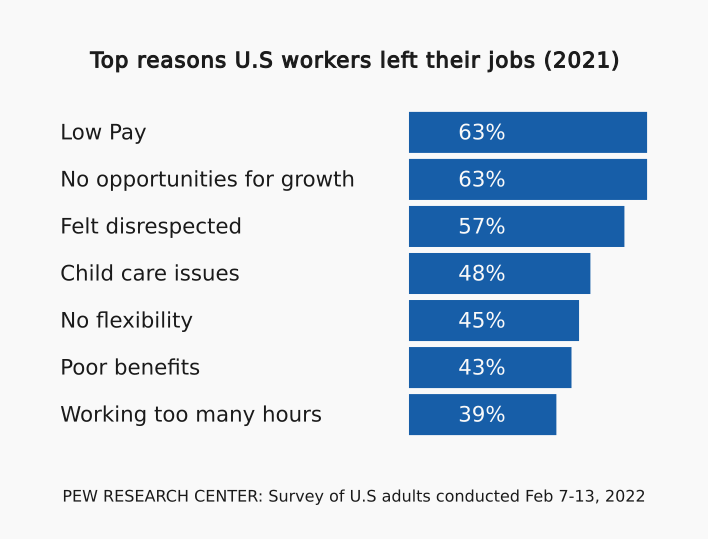The move from one job to another is a decision that shapes our immediate career and also our long-term goals. Job changes often come with mixed feelings. There is the excitement of new beginnings mingled with the uncertainty of leaving behind what’s familiar. Understanding the reasons that prompt such transitions is crucial for making informed decisions. This helps to align your career aspirations and personal growth.
Job Satisfaction: Understanding the Importance
Job satisfaction is the cornerstone of a fulfilling professional life. Finding contentment in your job becomes paramount when you spend a significant amount of time at work. Satisfied employees are more likely to remain committed to their jobs and less inclined to seek alternative employment opportunities.
According to a study, employees who are dissatisfied with their jobs are more likely to have an intention to quit. A post-pandemic workforce has made being people-focused more important than ever. High employee satisfaction is the key to reducing employee turnover. A satisfied workforce is happy to go to work and has no reason to leave.
Companies with high employee satisfaction have lower turnover rates, higher efficiency, and sustained business growth. A study highlights that remuneration is the highest point of satisfaction for employees who have no intention of leaving their jobs. Workplace relationships are also a driving force of job satisfaction.
Organizational culture is one of the top drivers of job satisfaction and has a significant impact on employee retention. Satisfied employees are more motivated to excel in their roles as they feel valued by their employers. This leads to higher levels of productivity, innovation, and overall performance.
Staying in an unsatisfactory job can lead to stagnation and complacency. This hinders your professional growth and mental well-being. Recognizing the importance of job satisfaction is the first step towards identifying whether it’s time for a change.
Related: 10 Essential Job Search Strategies to Land Your Dream Job
The Top 12 Good Reasons for Leaving a Job

-
Lack of Growth Opportunities
Imagine a job where each day feels like a rerun, devoid of challenges or chances to expand your skills. Lack of growth opportunities is a leading cause of job dissatisfaction. Careers thrive on learning and progression. When the avenues of growth are limited, it might be time to explore new horizons. 63% of workers who quit their jobs in 2021 reported no opportunities for advancement as a major reason.
Recognizing when your current role has become a dead end and seeking positions that offer room for advancement is a valid reason to consider moving on.
-
Toxic Work Environment
Workplaces are meant to foster productivity and collaboration. When toxicity seeps in, it can poison the entire work atmosphere. Signs of a toxic environment include constant negativity, lack of support and harassment. Such an environment affects mental health and also hampers productivity and professional development. A report from MIT Sloan Management Review found that toxic corporate culture is 10.4 times more likely to contribute to an employee quitting than low pay.
Leaving a job due to a toxic work environment is a responsible choice aimed at preserving your well-being and seeking a healthier workplace culture.
-
Better Compensation and Benefits
Money isn’t everything, but fair compensation and benefits are essential for feeling valued in your role. If you feel underpaid or undervalued despite your contributions, exploring opportunities that offer better compensation or perks can be a legitimate reason to move on. A survey by Skynova found that about 71% of respondents selected not being paid enough as the top reason for planning to quit.
Negotiating tactics, understanding your worth in the market, and considering roles that align with your expertise and value are crucial in this scenario.
-
Company Culture Misalignment
Company culture sets the tone for your work experience. When your values clash with those of the organization, it can lead to dissatisfaction. For instance, if you prioritize work-life balance but the company promotes a hustle culture, the misalignment can create discomfort and hinder your performance.
Leaving due to cultural discrepancies is about seeking a work environment where you feel comfortable and aligned with the values and ethos of the organization.
-
Work-Life Balance
The elusive work-life balance has become a critical factor in job satisfaction. As work demands increase, balancing personal life becomes more challenging. Constantly sacrificing personal time for work can lead to burnout and affect mental health.
Leaving a job for a better work-life balance demonstrates a commitment to maintaining a healthier equilibrium between professional and personal life.
-
Lack of Recognition or Appreciation
Feeling undervalued or unrecognized despite your contributions can diminish motivation and job satisfaction. Recognition isn’t just about praise; it’s about feeling appreciated for your efforts and accomplishments. 31% of employees with formal recognition programs have less voluntary turnover.
Leaving a job due to a persistent lack of recognition may signify a desire for a workplace that acknowledges and celebrates its employees’ contributions.
-
Desire for Career Change or Pivot
As career aspirations evolve, the desire for a change in trajectory may arise. Whether switching industries, exploring a different role, or pursuing a passion, a career pivot can be a legitimate reason for leaving a job. According to a Pew Research Center study, 53% of employed adults who quit their job in 2021 changed their occupation or field of work in the previous year. The same study found that workers younger than age 30 and those without a postgraduate degree are especially likely to make this type of change.
Exploring new avenues that align better with your interests, skills, and long-term goals can be a bold move toward a more fulfilling career.
-
Relocation or Family Obligations
Life changes, such as relocation due to personal reasons or family obligations, can prompt a job change. Balancing career aspirations with family needs or adapting to a new location might necessitate seeking new job opportunities.
Leaving a job for relocation or family obligations underscores the importance of balancing personal life and professional commitments.
-
Health Issues or Stress
The American Institute of Stress states that 83% of US workers suffer from work-related stress, with 25% saying their job is the number one stressor in their lives. Work-related stress can take a toll on physical and mental health. Constant pressure, long hours, or an unsupportive work environment can contribute to stress-related health issues. Prioritizing personal well-being becomes imperative in such situations.
If health concerns arise, taking proactive steps to safeguard physical and mental health might be very crucial.
-
Ethical Concerns
Ethical dilemmas can arise in the workplace, where personal values conflict with the company’s practices or policies. Standing firm on ethical principles is essential, and leaving a job due to irreconcilable ethical differences can reflect integrity and moral values.
Choosing to leave a job for ethical reasons demonstrates a commitment to upholding personal values and principles.
-
Job Redundancy or Layoffs
Economic downturns or company restructuring can lead to job redundancies or layoffs. Coping with unexpected job loss is challenging but leaving due to circumstances beyond your control doesn’t reflect negatively on your career.
Managing a layoff gracefully and seeking new opportunities is a pragmatic approach in such situations.
-
Entrepreneurial Pursuits
The entrepreneurial spirit beckons some professionals. Transitioning from employment to entrepreneurship requires courage, planning, and a calculated risk-taking attitude.
If you have a burning desire for autonomy, creativity, and a passion to create something of your own then you can leave your job to pursue entrepreneurial endeavors.
Related: Resume Examples That Get You Hired
Considerations Before Making the Move
Before deciding to leave a job, it’s crucial to assess the situation thoroughly. Reflecting on the impact, weighing the pros and cons, seeking advice, and ensuring a well-thought-out plan for the next step is vital. You also need to understand that job transitions are significant decisions and taking time to evaluate various aspects can lead to a more informed and confident choice.
Assess Your Reasons
- Reflection: Take time to introspect and understand the primary reasons driving your decision to leave. Are they aligned with your long-term goals and values?
- Weigh Pros and Cons: Evaluate the advantages and disadvantages of staying versus leaving. Consider both short-term and long-term implications.
Seek Advice and Support
- Talk to Mentors or Advisors: Seeking guidance from experienced professionals or mentors can provide invaluable insights. They might offer perspectives you hadn’t considered.
- Consult Career Coaches: Professional career coaches can help assess your strengths, weaknesses, and aspirations which in turn guide you towards a decision aligned with your career goals.
Plan Your Transition
- Financial Preparedness: Ensure you have a financial buffer to sustain yourself during the transition period without added stress.
- Job Search Strategy: Develop a clear plan for finding new opportunities, updating your resume, networking, and leveraging online job platforms.
Evaluate the New Opportunity
- Culture and Values: Assess how well the new company aligns with your values and work culture preferences.
- Career Growth: Evaluate the growth opportunities, learning potential, and how the new role contributes to your long-term career goals.
Professional Relationships
- Exit Gracefully: Maintain professionalism when resigning. A positive exit can preserve relationships and leave doors open for potential future collaborations.
- Network Maintenance: Keep in touch with former colleagues and supervisors. They can be valuable connections in your professional journey.
Related: Jobs on Cruise Ships
Conclusion
Deciding to leave a job is a pivotal moment in one’s career journey. It’s essential to understand that such transitions are not just about leaving but about finding opportunities that align with your aspirations and values. Each reason to leave a job explored in this guide holds merit and significance.
By acknowledging the valid reasons and considering the crucial factors highlighted in this article, individuals can confidently leap and navigate this transition with clarity. Your career path is a reflection of who you are and your choices. Hence, it’s essential to prioritize your well-being, professional growth, and alignment with your values when contemplating a job change.
Related: Why Employment Agencies Are the Key to Landing Your Dream Job in a Competitive Market
- ATS Friendly Resumes: Navigating Applicant Tracking Systems Effectively - December 15, 2023
- Top 12 Good Reasons for Leaving a Job: A Comprehensive Guide - December 12, 2023
- Creating a Career Development Plan: A Step-by-Step Guide - December 5, 2023

